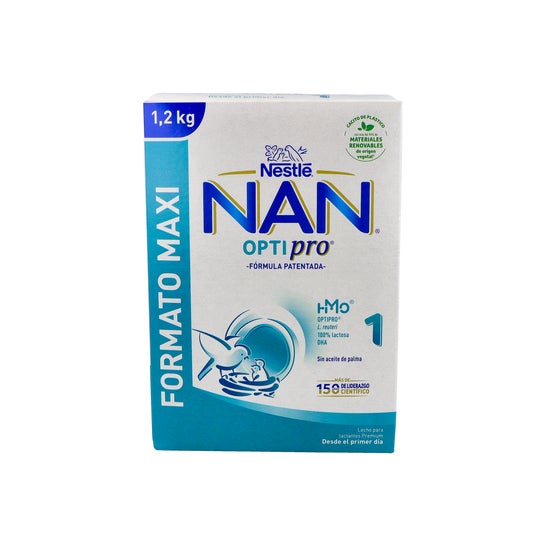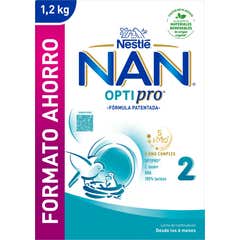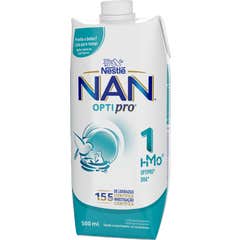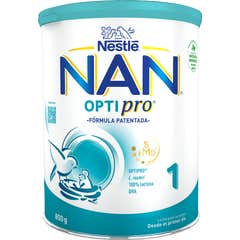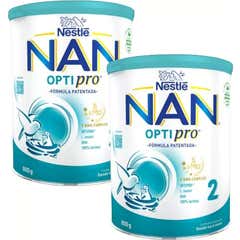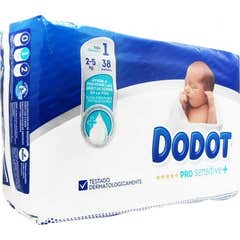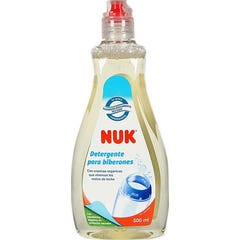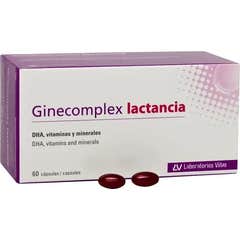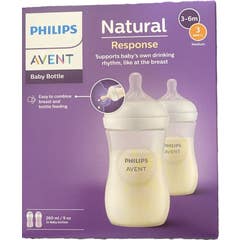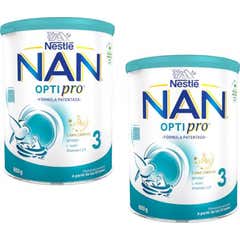Nestlé NAN Optipro 1 Maxi Format 1.2kg is a formula milk for infants. It is a product inspired by research carried out in Switzerland on breast milk for more over 60 years. The findings have resulted in a unique formulation that contains iron, probiotics (Lactobacullus reuteri), essential fatty acids and the Optipro protein scheme. Suitable for newborns and babies of up to six months. It provides a large amount of vitamins, minerals, nutrients, saturated and polyunsaturated fats and sugars. To keep the lactobacilli alive, it is recommended to cool boiled water to room temperature and then add the powder. Breast milk is the best way to feed babies. However, if it is not available, Nan milk is an excellent alternative, as it promotes the child's physical and mental growth and development.
Nestlé NAN Optipro 1 Maxi Format 1.2kg
Enviado por DocMorris
Formula milk that supports optimal infant feeding
Shipping in 24-72h
Enviado por DocMorris
Description
Instructions for use
Composition
Demineralised whey, skimmed milk, vegetable oils (rape, coconut and sunflower), milk proteins, lactose, mineral salts (calcium citrate, potassium hydroxide, potassium citrate, magnesium chloride, sodium chloride, potassium chloride, potassium chloride, sodium phosphate, calcium hydroxide, zinc sulphate, ferrous sulphate, cupric sulphate, manganese sulphate, sodium selenate and potassium iodide), 2′-O-fucosyl-lactose (2'-FL), fish oil, emulsifier (soya lecithin), vitamins (sodium L-ascorbate, DL-alpha-tocopherol acetate, retinyl acetate, nicotinamide, phylloquinone, D-calcium pantothenate, cholecalciferol, thiamine mononitrate, pyridoxine hydrochloride, riboflavin, folic acid, cyanocobalamin and D-biotin), choline, taurine, inositol, L-phenylalanine, L-histidine, nucleotides (cytidine, uridine, adenosine and guanosine), L-carnitine and lactic ferments (cultures of Lactobacillus reuteri).
Unit price
Pharmaceutical Advice
Carnitine is a molecule that transports fatty acids into the mitochondria where they are converted into energy. The active form of this molecule is known as L-carnitine (or levocarnitine) and it supports the metabolic system in generating energy. Although the body already generates it naturally, we can obtain this substance from our diet with foods such as beef, fish, wholewheat bread, chicken breast or tomatoes and carrots.
In addition to this, we can opt for dietary supplements, which are generally associated with effective weight loss. But is this true? L-carnitine does not have a fat-burning effect as such but contributes first and foremost to the metabolism of fats, which results in their increased mobilisation for conversion into energy.
It is also a nutrient directly associated with athletic performance, as L-carnitine helps to improve physical endurance, boosting energy generation during training. Dietary supplements that contain L-carnitine also help the body to recover faster after intense physical exercise. Remember that dietary supplements are not a substitute for a varied and balanced diet.
Safety and product information
Label information
Lactose, milk, and soy.
Safety visual aids
At this time we do not have safety images for this product, but we are working on it. We encourage you to check back later for updates. In the meantime, we recommend that you read the safety information that comes with the product before using it. If you have any questions about safety, please do not hesitate to contact us. Also, if you wish, you can also return the product by following our terms and conditions.
Manufacturer details
Manufacturing data details relevant information from the product manufacturer.
Nestlé©
Carrer Clara Campoamor, 2, 08950 Esplugues de Llobregat, Barcelona
nestle@nestle.es
https://empresa.nestle.es/es
RELATED SEARCHES ABOUT 0-6 Months
New in Milk
- BabyBio Optima 2 con Fibras 6-12 Meses 400 g
- Aptamil Nutri-Biotik 2 +6M 800g
- Aptamil ProFutura 2 Duo Leite +6M 800g
- Aptamil AR 1 Leite Anti Regurgitação 800g
- Nutriben confort 2 800g
- Enfamil Premium Confort 3x800gr
- Enfamil Premium AR 3x800g
- BabyBio Leche Caprea 3 Bio 3x800g
- BabyBio Caprea 1 Leche ecológica 3x800g
- Babybio Óptima Crecimiento 3 3x800g

